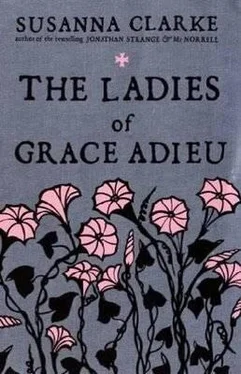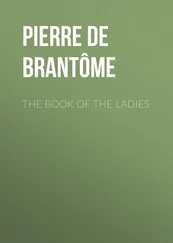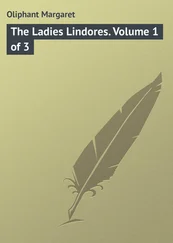So the Charcoal Burner told him; but the Charcoal Burner was not much practised in the art of giving clear accounts of complicated events. For example he spoke at great length about the huntsman who had got left behind, but he made no mention of the man's fine clothes or the jewelled rings on his fingers, so the Almoner had no suspicion that it might be the King. In fact the Charcoal Burner called him "a black man" so that the Almoner imagined he meant a dirty man – just such another one as the Charcoal Burner himself.
The Almoner was all sympathy. "So poor Blakeman is a salmon now, is he?" he said. "If I were you, I would go and have a word with Saint Kentigern. I am sure he will help you. He knows all about salmon."
"Saint Kentigern, you say? And where will I find such a useful person?" asked the Charcoal Burner eagerly.
"He has a church in Grizedale. That is the road over there."
So the Charcoal Burner walked to Grizedale, and when he came to the church he went inside and banged on the walls and bawled out Saint Kentigern's name, until Saint Kentigern looked out of Heaven and asked what the matter was.
Immediately the Charcoal Burner began a long indignant speech describing the injuries that had been done to him, and in particular the part played by the solitary huntsman.
"Well," said Saint Kentigern, cheerfully. "Let me see what I can do. Saints, such as me, ought always to listen attentively to the prayers of poor, dirty, ragged men, such as you. No matter how offensively those prayers are phrased. You are our special care.
"I am though?" said the Charcoal Burner, who was rather flattered to hear this.
Then Saint Kentigern reached down from Heaven, put his hand into the church font and pulled out a salmon. He shook the salmon a little and the next moment there was Blakeman, as dirty and clever as ever.
The Charcoal Burner laughed and clapped his hands. He tried to embrace Blakeman but Blakeman just ran about, squealing, with his customary energy.
"There," said Saint Kentigern, looking down on this pleasant scene with some delight. "I am glad I was able to answer your prayer."
"Oh, but you have not!" declared the Charcoal Burner. "You must punish my wicked enemy!"
Then Saint Kentigern frowned a little and explained how one ought to forgive one's enemies. But the Charcoal Burner had never practised Christian forgiveness before and he was not in a mood to begin now. "Let Blencathra fall on his head!" he cried with his eyes ablaze and his fists held high. (Blencathra is a high hill some miles to the north of Grizedale.)
"Well, no," said Saint Kentigern diplomatically. "I really cannot do that. But I think you said this man was a hunter? Perhaps the loss of a day's sport will teach him to treat his neighbours with more respect."
The moment that Saint Kentigern said these words John Uskglass (who was still hunting), tumbled down from his horse and into a cleft in some rocks. He tried to climb out but found that he was held there by some mysterious power. He tried to do some magic to counter it, but the magic did not work. The rocks and earth of England loved John Uskglass well. They would always wish to help him if they could, but this power – whatever it was – was something they respected even more.
He remained in the cleft all day and all night, until he was thoroughly cold, wet and miserable. At dawn the unknown power suddenly released him – why, he could not tell. He climbed out, found his horse and rode back to his castle at Carlisle.
"Where have you been?" asked William of Lanchester. "We expected you yesterday."
Now John Uskglass did not want any one to know that there might be a magician in England more powerful than himself. So he thought for a moment. " France," he said.
" France!" William of Lanchester looked surprized. "And did you see the King? What did he say? Are they planning new wars?
John Uskglass gave some vague, mystical and magician-like reply. Then he went up to his room and sat down upon the floor by his silver dish of water. Then he spoke to Persons of Great Importance (such as the West Wind or the Stars) and asked them to tell him who had caused him to be thrown into the cleft. Into his dish came a vision of the Charcoal Burner.
John Uskglass called for his horse and his dogs, and he rode to the clearing in the wood.
Meanwhile the Charcoal Burner was toasting some of the cheese the Almoner had given him. Then he went to look for Blakeman, because there were few things in the world that Blakeman liked as much as toasted cheese.
While he was gone John Uskglass arrived with his dogs. He looked around at the clearing for some clue as to what had happened. He wondered why a great and dangerous magician would chuse to live in a wood and earn his living as a charcoal burner. His eye fell upon the toasted cheese.
Now toasted cheese is a temptation few men can resist, be they charcoal burners or kings. John Uskglass reasoned thus: all of Cumbria belonged to him – therefore this wood belonged to him – therefore this toasted cheese belonged to him. So he sat down and ate it, allowing his dogs to lick his fingers when he was done.
At that moment the Charcoal Burner returned. He stared at John Uskglass and at the empty green leaves where his toasted cheese had been. "You!" he cried. "It is you! You ate my dinner!" He took hold of John Uskglass and shook him hard. "Why? Why do you these things?"
John Uskglass said not a word. (He felt himself to be at something of a disadvantage.) He shook himself free from the Charcoal Burner's grasp, mounted upon his horse and rode out of the clearing.
The Charcoal Burner went down to Furness Abbey again. "That wicked man came back and ate my toasted cheese!" he told the Almoner.
The Almoner shook his head sadly at the sinfulness of the world. "Have some more cheese," he offered. "And perhaps some bread to go with it?"
"Which saint is it that looks after cheeses?" demanded the Charcoal Burner.
The Almoner thought for a moment. "That would be Saint Bridget," he said.
"And where will I find her ladyship?" asked the Charcoal Burner, eagerly.
"She has a church at Beckermet," replied the Almoner, and he pointed the way the Charcoal Burner ought to take.
So the Charcoal Burner walked to Beckermet and when he got to the church he banged the altar plates together and roared and made a great deal of noise until Saint Bridget looked anxiously out of Heaven and asked if there was any thing she could do for him.
The Charcoal Burner gave a long description of the injuries his silent enemy had done him.
Saint Bridget said she was sorry to hear it. "But I do not think I am the proper person to help you. I look after milkmaids and dairymen. I encourage the butter to come and the cheeses to ripen. I have nothing to do with cheese that has been eaten by the wrong person. Saint Nicholas looks after thieves and stolen property. Or there is Saint Alexander of Comana who loves Charcoal Burners. Perhaps," she added hopefully, "you would like to pray to one of them?"
The Charcoal Burner declined to take an interest in the persons she mentioned. "Poor, ragged, dirty men like me are your special care!" he insisted. "Do a miracle!"
"But perhaps," said Saint Bridget, "this man does not mean to offend you by his silence. Have you considered that he may be mute?"
"Oh, no! I saw him speak to his dogs. They wagged their tails in delight to hear his voice. Saint, do your work! Let Blencathra fall on his head!"
Saint Bridget sighed. "No, no, we cannot do that; but certainly he is wrong to steal your dinner. Perhaps it might be as well to teach him a lesson. Just a small one."
At that moment John Uskglass and his court were preparing to go hunting. A cow wandered into the stable-yard. It ambled up to where John Uskglass stood by his horse and began to preach him a sermon in Latin on the wickedness of stealing. Then his horse turned its head and told him solemnly that it quite agreed with the cow and that he should pay good attention to what the cow said.
Читать дальше












